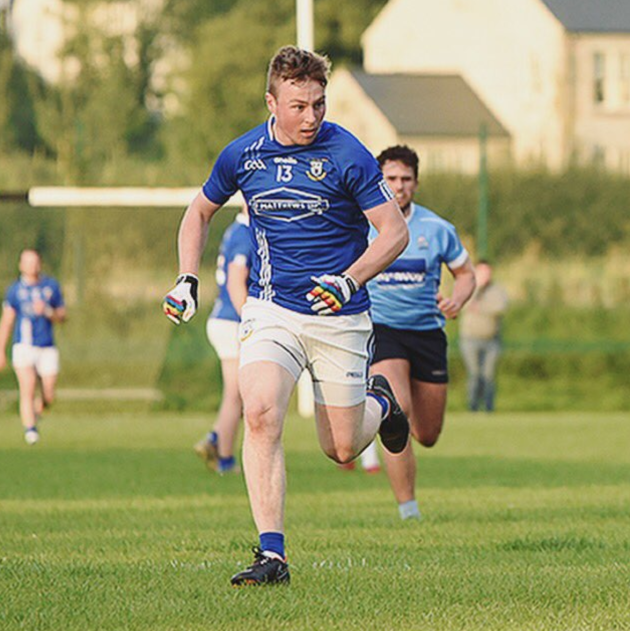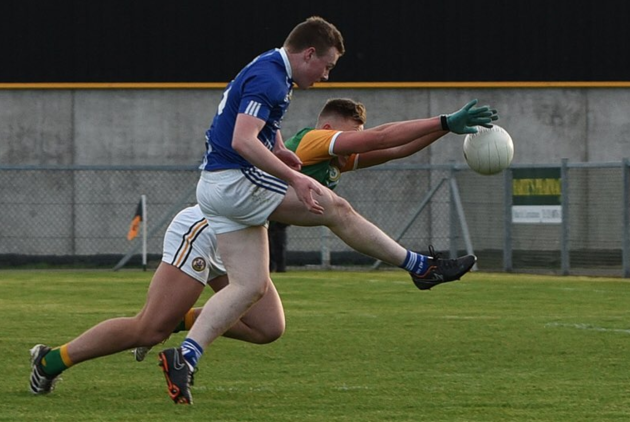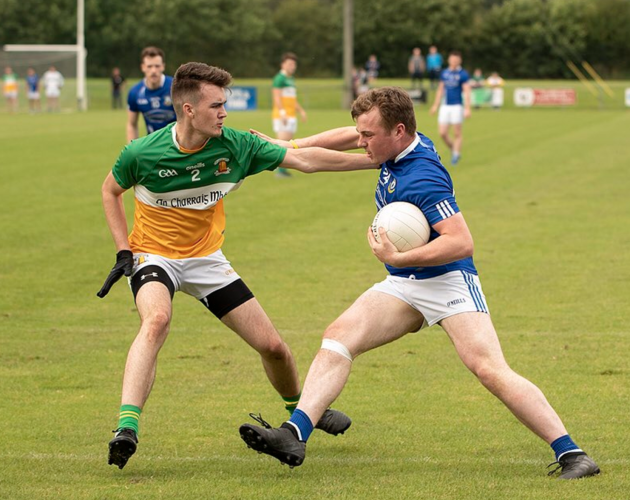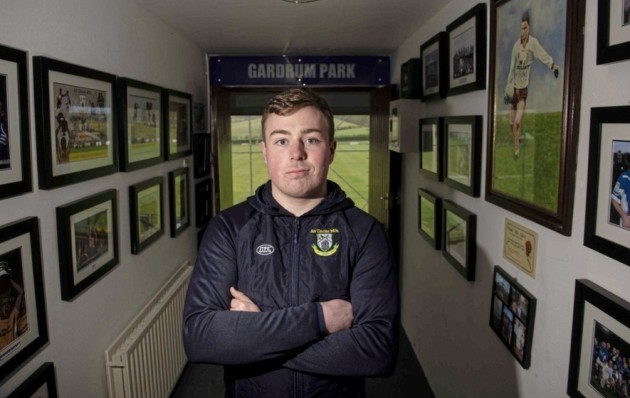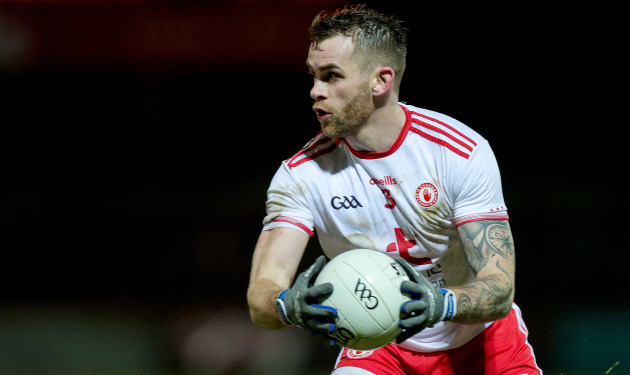RISING FROM THE brink — My story.
Oran Sludden sat down one day and started writing.
The Tyrone football prodigy was not yet 21, but he had already experienced more than most others do in a lifetime. The aftermath of three cruciate injuries and the resultant isolation from football sent his life into a downward spiral. He soon found himself in a sea of depression, clinging to drinking and gambling for comfort. It all turned into a vicious cycle, and ultimately led to two separate suicide attempts in late 2019.
Now, after finding light at the end of the tunnel, Sludden wants to share his story, spread his message and primarily, help others.
And so, a few weeks back, he sat down and wrote it all out in his own words, after suggestions from councillors and therapists.
“Thinking about it in your head is obviously a lot easier than getting the words down on a page,” Sludden says. “I just thought, ‘You know what? I’ll give it a shot.’
“I started writing, and it was great once I did start. I could have wrote much more. It probably took a real weight off my shoulders to do it. It seemed like such a tough task to write it down on paper, but when I read it through it, it gave me a lot of inspiration of how far I actually had come over the space of a year or a year-and-a-half.
Then it was about getting the message out there. It’s brutal honesty, and people want honesty. That’s why: I’m just sharing the message to people, to tell them, ‘It actually is okay to be suffering as such, but not to suffer in silence.’”
On 22 February 2020, he posted the powerful 2,500-word account on his Facebook page. It now has 3.2k reactions, 269 heartfelt comments, and has been shared 423 times.
Cahair O’Kane of The Irish News was one of the many to read the post, and he reached out to Sludden for a potential interview.
“I was probably a bit taken aback because I didn’t realise how many people it would actually reach,” Sludden recalls. He talked it over with his therapist, thought about it quite a lot and took his time through the process.
But he knew it was something he wanted to do. Not for himself; for others.
“I wanted to get it out to a broader audience. Not even the sporting community. This topic is nothing about religion or anything like that. When somebody’s suffering, you just want to try and reach out to them.
As I always say, you learn when you go through it, you struggle and you come out the other side. You have to realise that you’re not going to save everybody, you can’t save the world, but if you say a wee bit in a piece or two that a couple of people pick up on, you’re happy.”
The reaction to everything was like nothing he ever expected, and he’s so glad he did it.
“It was overwhelming, but that’s good,” a delighted Sludden beams, explaining how he and his girlfriend headed off to Galway for a few nights around the time of publication.
“Where I come from in Dromore, it’s a massive GAA environment and everyone around you is mad into it and sport. You know yourself with GAA players mingling together, everyone wants to chat to you, everybody wants to have a word.
“It was just good to get away for a couple of days, and clear the heads. Obviously it was still a topic we’d be chatting about, but it didn’t feature as much. The coronavirus has taken over, everybody’s caught up in it.”
The beginning
Even up until a couple of months ago, my thing was football, football, football. It was sport, sport, sport. Now, today, it wouldn’t be the same. The interest isn’t as much.
With everything that’s happened, a lot has changed — but for a healthier me as such. I’m probably more content with myself for taking that step back from sport for the time being.
GAA was all Oran Sludden ever knew. There was no getting away from it.
The youngest of five siblings — one of those Tyrone senior star Niall — the son of typical football parents and the nephew of referee, Martin, he couldn’t get enough of it. Like everyone else in Dromore.
Like many others, he started with the U6s and climbed the ranks with a strong team. Winning became a habit. Life was good. Sludden’s star rose and rose, and he was captain for the club’s U16 county championship success, and subsequent Ulster run.
Once you get that winning taste, it’s hard to get away from it. You just think everything is going normal, and everything is going to go normal.
“It’s when that curveball comes in, not being able to play; that probably shows what can actually happen when you do get so consumed by the GAA. You go into your house, your three older brothers play, your father was groundsman and ex-chairman. Your mother and sister too, it’s just football, football, football. It’s all that’s talked about.
“It can be very hard to get away from. Playing, it was grand. You were able to talk about it because you knew you were going to be going back out, but the fact that you weren’t able to play, that’s when it started to have a mental deterioration which you didn’t really see.”
The 21-year-old’s relationship with GAA has changed drastically, the first significant blow landing in December 2018. 7 December, he remembers the night he suffered his second dreaded cruciate injury well.
The first one came a little over two years beforehand, in an U18 league final in May 2016. It happened five minutes into the game, but Sludden played on. He didn’t take the diagnosis too badly, probably because he didn’t know what he was facing into.
“It was like going into the unknown and you were going in with 100% commitment,” he recalls, adding that he was still in secondary school, living at home and in a set routine.
He worked diligently, the hunger clearly there to get back to the game he loved so much. And he did just that.
After winning the Tyrone U21 championship with Dromore that April, the eyes were set on another Ulster run the following January. That December was the first time Sludden found himself back in his prime after his first major injury.
And then he was struck down once again in training.
“It was a real kick in the teeth,” he sighs, “especially with that tournament coming up within a couple of weeks. That was probably the hardest thing. Them competitions don’t come about all the time.”
Things had been going so well off the field too. He was enjoying college life in St Mary’s University College, Belfast, and finding the balance between work — or football — and play.
As Sludden prepared for surgery and the start of another lonely road back, his side were victorious. That nearly made things worse.
“It was a big, major achievement, the first men’s Ulster club title ever. But you knew that you didn’t play a part. It was that whole thing of, ‘You’re still a part of the panel,’ but you weren’t there. You never offered any part on the playing pitch, which was hard.
The surgery came two weeks prior to the final. It all probably fell at the wrong time. There was a lot of frustration on my part, seeing all your friends and ones the same age playing, and you just asking yourself, ‘Why always me?’”
It’s mentally soul-destroying, as he told Ireland international and fellow cruciate victim Chloe Mustaki the day before our conversation, when she reached out after reading his story.
“I said to her, ‘The main thing to look at is making sure you do it right,’” Sludden notes of the rehabilitation. “Physically, it doesn’t drain me but usually it will mentally drain you because it’s such a lonely place you’re in.
“You’re doing all your rehab in the gym when everyone else is out training. You’re in the gym by yourself trying to do wee tedious exercises which you could do normally, but have to do it all again to strengthen the leg.
It’s a draining road for any sporting athlete; professional, semi-professional or amateur. It’s a major, major blow. Even for people coming back from it, people suffer confidence-wise, there’s a fear of doing it again. It’s that fear of having to travel that long road again, which scares a lot of people.
Downward spiral
Back to his own personal story. As the mental torture heightened, the hunger diminished. Boredom kicked in, and Sludden looked elsewhere for his kick.
Living in Belfast for college, things started to go downhill. As his friends and team-mates travelled down to Dromore for training every Tuesday night, he stayed put.
“That left me obviously isolated,” Sludden picks up. “It gave me more time to think, I started overthinking the whole thing. Then it leads you to other factors of going down to the pub, taking a couple of drinks. Down to the bookies, having a couple of bets if there was Tuesday or Wednesday night Champions League or whatever.
“I was out of playing sport, but the gambling was keeping me in sport. When you were gambling, you were taking interest in the things you were gambling on — which you might have never had any interest in before.
“The one thing I’ll say about it is I was always able to make sure that I caught it at the right time. I got it at the right time, and I got the help that I needed for it and I’m obviously benefitting now.”
But back to that time.
“It was a vicious cycle, and I ended up in a rut. That summer period of 2018, there were six-to-eight days where you were going out drinking with anybody. You were going out with fake friends because you knew your real friends were training and preparing for matches so they weren’t going out. You were going out with people just to get a night out.
“You were trying to take as much drink as you possibly could to give yourself a high for a while, and then the next morning was the real downer. Alcohol is a major depressant, and a lot of ones don’t see that.
It can have scary effects on the brain, the mind and what you’re thinking. For me, when I was going through the roughest period, I turned to alcohol and it just blacks your mind. It makes you really a one-thought process, you’re just thinking one thing and you can’t be turned.”
A wise head on young shoulders, he sees that now.
He dishes out advice throughout our chat: if you’re not feeling well heading on a night out, don’t take a drink. If you’re not feeling mentally-well in college, or just not feeling yourself, take a year out. Step away from the “vicious world” of social media if needs be.
But unfortunately, back then, he couldn’t.
He wasn’t aware, but he was slipping further and further into a sea of depression.
And to make it all worse, Sludden sustained a third cruciate injury after frustration led to him taking a chance too soon after his second. He didn’t do his rehab right — “the head just wasn’t there, it was a real messed-up year” — but returned to full training just six months post-surgery (recovery usually takes 9-12 months).
After making it through a reserve game unscathed, and with serious championship ambitions — “I probably deluded myself that I was ready. Championship was the be all and end all because that was the first time we drew Trillick in about 10 years. It’s a massive game, but it all counted for very little” — Sludden made his playing return for the Dromore seniors a week later.
He kicked three points from play early on but within 10 minutes, the damage was done again. He planted his right foot, pushed off and the knee wobbled and gave way. 10 minutes later, he was off the field, dreading the inevitable.
The first time this downward spiral registered with Sludden was in late August/early September 2019. He was heading back up to Belfast to start the third year of his Physical Education [PE] degree, and Freshers Week and the constant partying soon took its toll.
“You were going out, you were struggling to get up but you were making the excuse of being hungover to your friends for not making class. But the fact was you really didn’t want to get out of bed.
“You were in that depressive state, lying in your bed until two or three o’clock in the day, missing breakfast and lunch, getting up for a quick shower and going back down to drink again. You were just falling into a bad rut.
Depression, it’s a real slow burner. That’s what people probably don’t realise about it. This probably came on me from January 2019 and it didn’t actually explode until about October 2019. I had contained it for seven, eight, nine months and then it exploded within the space of six weeks.
“It builds up and it builds up in your head, depression. It’s trying to see the signs. Now when I look back, hindsight is a great thing. You were able to see that there was something going on, but you weren’t actually able to put your hand on it to say what it was. That’s probably what the more confusing part of it was at that time.
“I was probably thinking to myself it’s just normal adult behaviour… and it wasn’t. It was actually real depression kicking in. But when you’re in that state and in that time, it’s very hard to see.”
As the days rolled into weeks, and time almost blurred, Sludden became more aware of the situation. He tried his best to conceal it though, to wear a mask almost.
Some friends and family had a slight idea, and realised his form dipped over the summer. But again, hindsight is a great thing. They surely didn’t realise the extent of his struggles at the time, or the veracity of his decline.
“The gambling covered up a lot too,” he adds. “I was probably playing on it. It was probably being seen as a more of a major factor than it actually was. It actually wasn’t that major of a factor, the sporting injuries were hitting at it big time.
Sport was a massive trauma in my life, it was so much, it was everything. My life revolved around the GAA, it was my social life. With your friends, your partner and your family, it dictated the terms. The gambling probably hid a lot of it.
“As I say, hindsight’s a great thing and you’re just glad you’re on the right side of it now.”
Ultimately, Sludden didn’t know how to cope without sport. The descent into drinking, gambling and depression soon came to a near-fatal head.
Recovery
‘Did you want to die, or did you see things to live for?’
After admitting himself into Gransha Hospital’s mental health unit following his second suicide attempt in early December 2019, Sludden’s recovery began immediately. That’s one question that really stands out, and it was asked of him by a local parish priest who came in to chat to him.
“I obviously saw things I wanted to — and I knew I could live for, but when I was in such a black state, all you’re thinking about is death,” Sludden says.
“That’s the thing a lot of people don’t understand about that state. You hear ones saying, ‘Ah, did they not think about such and such here and there?’
But I can vouch for people like that. When you’re in that state, you aren’t thinking about anybody. You really aren’t like. You aren’t thinking about the devastation left behind for your family, friends, community. People are just trying to get rid of that pain, just wanting it to stop.
“That’s probably the big thing that a lot of people don’t see with mental health sufferers who maybe attempt to take their own lives: you just want the pain to stop, and you’ll go to any extreme to do it.
“My message now is I’ve been to the extreme — and that’s what probably stands me in good stead to actually promote my messages.
“Now, I’m trying to put the positives out there of how good it is to actually reach out. The reaching out is obviously the hardest part for everybody, but there’s so many rewards in return when you do it.”
Those first steps may be the most difficult, but they’re the most worthwhile. They’re the ones that stand to the person in the long run. Sludden was in Gransha for a week, and he got out just in time for Christmas.
Intense counselling, therapy and Cognitive Behavioural Therapy [CBT], in particular, were all vital on his road to recovery. CBT is all about changing the way you think, and he’d encourage anyone struggling to utilise that service.
“The thing is you have to go in with the right mindset. One side of me is so powerful, that was my own decision because I knew I needed the help at that time. I wanted to change. You have to want to change for the better, to work off the experts on what to do.
“It was massive in there, I learned so much just with how to cope on the outside. You understand that nobody has a perfect life, everybody has the shit days. It’s not going to be perfect every day, but it’s just about how to work with them days which is vital. It was a big learning for me on how to open up more. Going in there, I opened up and I’ve taken that opening up from there out into the wider audience.
When you go through the stages of where I’ve been to, you just want to try and help as many people as you can. I went from being a GAA fanatic, wanting to be the best GAA player in Ireland to now, wanting to help as many people within Ireland as possible.
“It shows you how your life can turn a full circle. I went from wanting to win championships with Dromore and All-Irelands with Tyrone to now, wanting to help as many people who are struggling out there. That’s the big thing that I’ve seen. It changes your mind itself, for such a healthier me.”
Talking and opening up helped more than anything — though he struggled with it a lot at first — while showing emotion in the early days of his recovery was also a release for Sludden. He is keen to break the stigma around mental health here, particularly from a male point-of-view.
Dublin star Nicole Owens spoke brilliantly about it in an interview with The42 last year, exploring why men can’t show signs of weakness: “We have this intrinsic idea of masculinity,” she said in an in-depth piece. “Talking about mental well-being is stigmatised.”
Sludden recognises that, and stresses how important it is for men not to be afraid to cry, or show emotions. It’s something he and his good friend, Tyrone All-star Ronan McNamee — who shared his own mental health struggles last year — speak about a lot.
The thing we’re always saying is the times have gone now from the real hard-man dressing room in GAA,” he explains. “Times have just changed, as everything has changed over time.
“We were even citing examples of Dromore and Trillick, the two biggest rivals in Tyrone, you would have never chatted to ones from Trillick and now you do chat to some of the players. It’s just a changed time.
“Mental health… it’s the thing of players going into dressing rooms, not wanting to tell another fella or the manager that they’re not feeling alright. It’s wrong now in today’s society. It should be okay to say it, and it should be okay to shed a tear.
“I know for three consecutive days in Altnagelvin Hospital [after his second suicide attempt], I burst like a river. I never would have been like that. But when I look back, I was so glad to do it.
“Don’t be afraid to show your emotions. There’s nothing wrong with shedding a tear.”
It may appear weak, but it’s the ultimate sign of strength to say that you’re not feeling okay, he adds. There’s absolutely nothing to be embarrassed or ashamed about.
“That’s probably another part of my message to sporting athletes too, it’s okay to ask for help because everybody needs help in the wider world,” he continues.
To become the best GAA player, you don’t just do it by yourself. You don’t become the best GAA manager or sporting athlete or anything in any sport but doing it all by yourself. When you look back over your career, you will always say, ‘There was that person, this person giving me a wee bit of advice here and there.’ And that’s so important.
“Jamie O’Hara, he would have played for Wolves, he did a thing on mental health for Sky Sports. He suffered with depression too, I just watched it and he said what made him feel strong was wanting to try and open up to the players in the dressing room to say that he wasn’t okay.
“Me and Ronan McNamee, we feel that there is a wee change slowly. The more people that do come out and talk about their problems, ones are going to take more confidence from that.”
Today
‘It may be stormy now but it never rains forever.’
Oran Sludden is out the other side of the black state he was in, that’s for sure. But dealing with his mental health is an ongoing battle.
That will never finish.
“It will never matter until what age I live, every day is a day for recovery,” he nods. “You’ll never have it completely beat, the door will still always be probably ajar. You’ll never shut it. It’s about making sure you keep it ajar. You’re on the right side of it now but it’s about keeping track of it.”
He’s doing just that, and encouraging others to come on the journey with him on his Instagram and Facebook pages, Project Hope&Beyond.
“Over this period of time with the coronavirus and people being locked down, I’ve turned to doing wee blurbs and posts for people to see wee benefits. They’re about anything; making every day count, trying to keep a good routine and a good sleeping pattern.
“All these things are very good for mental health improvement — sporting performance even. It’s just about giving people wee tips. It’s not about seeing how many likes you get or anything, it’s about getting your message out there, to help as many people as possible.
I’ll always go back to saying you can’t save the world, but if you get a couple of people taking your advice on board and using it to their benefit, that’s well and good for me.
Sludden underwent knee surgery for the third time in January, and is currently rehabbing that third cruciate injury sustained last summer. He’s taking his time through it all, with no real goal set as a return to sport isn’t on his radar right now. There’s no rush.
A “retirement message” of sorts was put in the Dromore group chat, but the door remains open. He’s not ruling football out just yet.
He’s taking a break from college, with his journey changing his thinking on that front. He’s taken a strong interest in psychology in sport, so that may be one for the future.
He’s still undergoing therapy, attends a councillor every month at Dunlewey Addiction Services, Belfast, and is enjoying the healing process.
It’s been a busy few weeks, in which he hit the milestone of the big 2-1 too. On Easter Sunday, the plan was to celebrate with a coffee morning and raise funds for Dunlewey, Gransha and Aware, but the Covid-19 crisis changed that fairly quickly.
A Facebook post had to do instead. For now.
“It’s powerful, just turning the 21 milestone,” he smiles, “because I suppose back when you’re in the dark place, you never thought that you might reach it.
You’re so happy now and proud that you’ve reached it, but in a good place, in a better place for what’s happened. I’m just trying to push on every day. It’s baby steps.
One phrase he lives by is, ‘It may be stormy now, but it never rains forever’. That was one of the first messages he was taught in Gransha, written in plain black and white on the first worksheet he completed.
Maintaining your mental health and talking, that’s key. As he says, hindsight is a great thing. Sludden has seen what happened him in the past, and he certainly won’t let it happen again.
“Definitely,” he concludes.
“You want to help for a big sporting reason because sport was a massive part of my life, especially the GAA. You do it for all sporting athletes, but you do it also for everyone else out there that’s suffering with some mental health issues, basically telling them that it is okay to suffer and there is probably light at the end of the tunnel.
You just keep chipping away and trying to get through the bad days. I always go back to that Gransha quote, ‘It may be stormy now but it never rains forever’ and it’s so true.
“Just keep chipping away and the better days will come again.”
That, they will. And that’s a mantra for each and every one of us in these strange times.
***
You can find Oran’s ‘Project Hope&Beyond’ Facebook page here, and Instagram here.
If you need to talk, contact:
- Pieta House 1800 247 247 (suicide, self-harm; 24/7 support)
- Samaritans 116 123
- Aware 1800 80 48 48 (depression, anxiety)
- Teen-Line Ireland 1800 833 634 (for ages 13 to 19)
- Childline 1800 66 66 66 (for under 18s)
The42 is on Instagram! Tap the button below on your phone to follow us!
